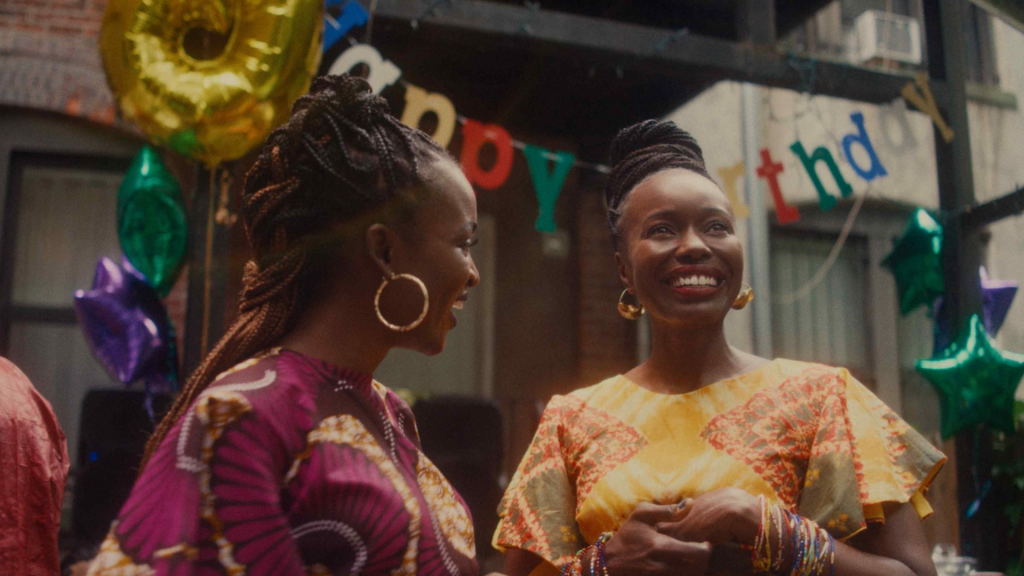African folklore and mythology play an integral part in the filmmaker Nikyatu Jusu’s supernatural thriller Nanny.
Walking into the press and industry screening of Nanny, I had absolutely no expectations of the film. From watching the trailer I knew that this would be an elevated horror centred on an immigrant from the continent working for an upper-class white family who has little regard for her humanity, and the horrors she faces while working for them; though not completely on the ball, I wasn’t too far off.
The film centres on Aisha (Anna Diop) an educated Senegalese immigrant living in America who takes on a minimal job as a nanny for an upper-class dysfunctional white family to fund the travel of her 6-year-old son Lamine’s flight to America but all does not go as planned.
In introducing audiences to Aisha, Nikyatu Jusu invites us into the world and experiences of the immigrant nanny: holding onto their culture in a foreign land by gathering together outside of work at parties full of music, food and laughter, meeting each other at the local playground to vent their frustrations disguised in humour, bonding with one another at the hairdressers, and caring for the children they look after through sharing stories, and in this case the love of jollof rice, to the dismay of the child’s mother who is almost revolted that her child is eating “food too spicy for her tummy”.

Aisha must also deal with the fact that she is not being paid what she is due, keeping her from being able to bring her son to America when she planned to. She is faced with the micro-aggressions of her boss Amy (Michelle Monaghan) who constantly excuses her behaviour towards Aisha: not paying her for the hours she is owed; constantly coming home late, expecting Aisha to understand her as a woman trying to make her way in a man’s world. And the unwarranted advances of Amy’s husband – a photojournalist intent on showcasing how liberal and proactive he is in the plights of those from the third world and war-torn countries.
In the midst of all of this, there is a malevolent presence that haunts Aisha in both her dreams and her real-life almost to the point of harming herself and others. She has vivid nightmares of being submerged in water unable to breathe as her bed sheets trap her beneath them, this follows her in her wakefulness experiencing a supernatural presence wherever water seems to be running. There are memorable scenes one where the shower runs whilst she is playing hide and seek; in the bathroom after taking a shower she sees her reflection take on a life of its own which made the audience gasp in fright.
The use of immersion and submersion into water throughout the piece comes to a culmination at the end of the film in two poignant scenes when we see Aisha almost drown but is saved by Mami Wata which seems to symbolise a re-emergence and new life both within and outside her body; and when we see Aisha in a fetal position in the bath surrounded by water.
Nikyatu Jusu draws inspiration from the classic African mythological gods Anansi (the spider God that represents trickery) using him as almost a portal of communication between Aisha’s son Lamine and the little girl she looks after. She also calls on Mami Wata the mythical mermaid, (who in this instance acts as a warning that unfortunate events have taken place but is also indicative of renewal) interweaving them into the story as elements to not only be afraid of but to take heed in the messages they send to you.

Diop is brilliant as Aisha, showing versatility in how she conveys emotion at different points throughout the film. She’s a devoted mother she shows how soft she can be in the moments we see her interacting with her young charge, or gazing at the phone screen watching recordings of her son, she expresses an almost silent determination, resilience and strength when speaking to her employers and we see how soft, flirtatious and sensual side in the relationship she shares with her boyfriend Malik (Sinqua Walls).
I also enjoyed the fact that the exploitation and abuse that domestic workers face was not the premise of this story. Yes, we see the advantage that is taken of these women in moments where your blood boils like when Aisha’s employers delights that “colonial red, all reds look good on you” which screams of racial undertones, but we have enough trauma porn to last us a lifetime.
Nanny is a great introduction to African folk history but stops short of developing the storyline, instead concentrating on moments that could have been displayed in a much shorter capacity. There’s a long drawn-out “date night” between Malik and Aisha which seemed to channel a Queen and Slim like vibe that had not much to do with the premise of the film. Yes, they were falling for each other but we did not need to see those moments played out as delicately as they were – giving the feeling of two separate films merged into one.
The film feels rushed in the last quarter where we find out a devastating truth, the reason for the supernatural presence and the promise of new life all role into one. The suspense we feel early on dwindles as each storyline blends unfinished into one another creating a somewhat confusing ending.
Nanny has all the elements of an auspicious thriller but is overdeveloped in some areas whilst underdeveloped in others, but what keeps you intrigued are the jumpy moments, depth of feeling, empathy and warmth that Diop carries throughout.
